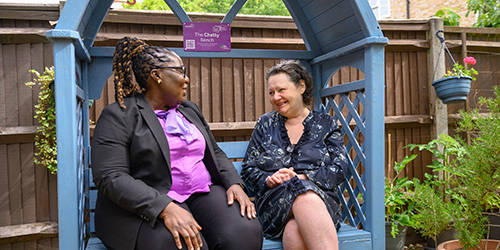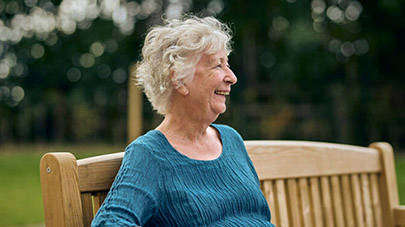- Home
- Guides & support
- Spotting the early signs of dementia
Last reviewed 31 January 2025
Spotting the early signs of dementia
It is important to understand that dementia affects people in different ways however there are some dementia symptoms that are experienced more commonly than others.
Broadly, the symptoms associated with dementia are a decline in memory, reasoning and communication skills, a gradual loss of the ability to carry out daily activities and to make sense of the world around us, and confusion. The symptoms of dementia gradually develop over time, but how fast the dementia progresses will depend on each individual.
 The NHS advises that if you or a loved one is becoming increasing forgetful, particularly if aged over 65, it is a good idea to seek medical advice in case it could be an early sign of dementia. Often, the fear of dementia can prevent people from seeking help or advice – but seeking advice early could rule out causes that may be treatable.
The NHS advises that if you or a loved one is becoming increasing forgetful, particularly if aged over 65, it is a good idea to seek medical advice in case it could be an early sign of dementia. Often, the fear of dementia can prevent people from seeking help or advice – but seeking advice early could rule out causes that may be treatable.
Common symptoms of dementia
The following are some of the most common signs and symptoms of dementia, though it’s important to remember that everyone experiences dementia differently. If you notice any changes that become persistent, significantly impact daily life, or are accompanied by other symptoms of dementia, then speak to a doctor.
The most common cause of dementia is Alzheimer's disease, which can manifest in the following ways:
Increased forgetfulness
One of the most common early signs is forgetting recent events, conversations, or appointments. This can manifest as misplaced keys, difficulty remembering the names of familiar objects, or forgetting what you were just doing. However, occasional forgetfulness is a normal part of ageing, so the key is to look for a pattern of increasing forgetfulness that interferes with daily life.
Confusion in conversations and familiar environments
People may find it difficult to follow conversations, lose track of the topic, or repeat themselves unintentionally. Struggling to find the right words, using incorrect words, or having difficulty expressing yourself clearly can be signs of early dementia. A person may also feel disoriented in familiar places, forget the date or time, and have difficulty navigating previously known routes.
Increasing difficulties with tasks and activities
Tasks that require concentration and planning may become increasingly difficult. Examples of these tasks include managing finances, cooking a complex meal, or following instructions. A person may find it a challenge to prioritise different tasks then make decisions and follow through with actions. This can also illustrate how people with dementia struggle with sequencing.
Changes in behaviour and mood
Due to all of the symptoms outlined above, an individual can become irritable and frustrated at their inability to do what they could previously. Forgetting things, struggling to follow conversations, or difficulty completing tasks can lead to feelings of helplessness. This can manifest in short tempers, snapping at loved ones, or becoming easily upset over minor inconveniences.
Please note that there are many things that can cause these symptoms that are not dementia, so always contact your GP in the first instance to rule out treatable conditions if you have any concerns.
 Symptoms specific to other types of dementia
Symptoms specific to other types of dementia
Dementia isn't a single disease, but rather a term used to describe a decline in cognitive function that affects daily life. Different types of dementia can have distinct symptoms and progression patterns. Here's a closer look at some other types of dementia and their specific symptoms:
Vascular dementia symptoms
Vascular dementia is the second most common cause after Alzheimer’s and it’s caused by reduced blood flow to the brain due to strokes or damaged blood vessels.
Some symptoms of vascular dementia overlap with Alzheimer’s disease, such as problems with planning, sequencing, concentrating, memory, and language. Depression is a particularly common symptom, which could even be caused by damage to the ‘emotion’ parts of the brain. People with vascular dementia may experience more physical symptoms over time like weakness, loss of bladder control, difficulty walking, or balance problems.
Lewy body dementia symptoms
Dementia with Lewy bodies (LBD) is characterised by abnormal protein deposits called Lewy bodies in the brain. Many symptoms of this type of dementia overlap with Parkinson’s disease.
Movement problems similar to Parkinson's disease, such as tremors, rigidity, and difficulty with walking, may be present. Around 70% of people with LBD experience visual hallucinations at some point, where they may see people or animals. Other cognitive symptoms include unpredictable changes in concentration, alertness, and confusion.
Frontotemporal dementia symptoms
This type of dementia is less common and affects the frontal and temporal lobes of the brain, which are responsible for personality, behaviour, language, and decision-making.
The most common frontotemporal dementia symptoms are behaviour and personality changes like becoming more withdrawn, impulsive, or socially inappropriate. A person may show a lack of empathy, judgement, inhibition, or interest. Some individuals could experience language difficulties where they have problems with finding words, difficulty understanding complex speech, or changes in writing style.
Getting help and support for someone living with dementia
If you are concerned about yourself or a loved one experiencing any of these signs of dementia, it's important to seek professional medical advice. Early diagnosis can significantly improve quality of life and allow for better planning for the future.
At Anchor, our care homes are supported by dementia specialists who understand the unique needs of each resident. We provide supportive and stimulating environments that promotes wellbeing for those living with dementia. If you'd like to learn more about how Anchor can support you or your loved one on a journey with dementia, please visit our Dementia Care page.
Related information about dementia
This website uses cookies which track activity so that you get the best possible experience. By continuing to use this website we will assume you are happy and cookies will be set. You can change your cookie settings at any time.












